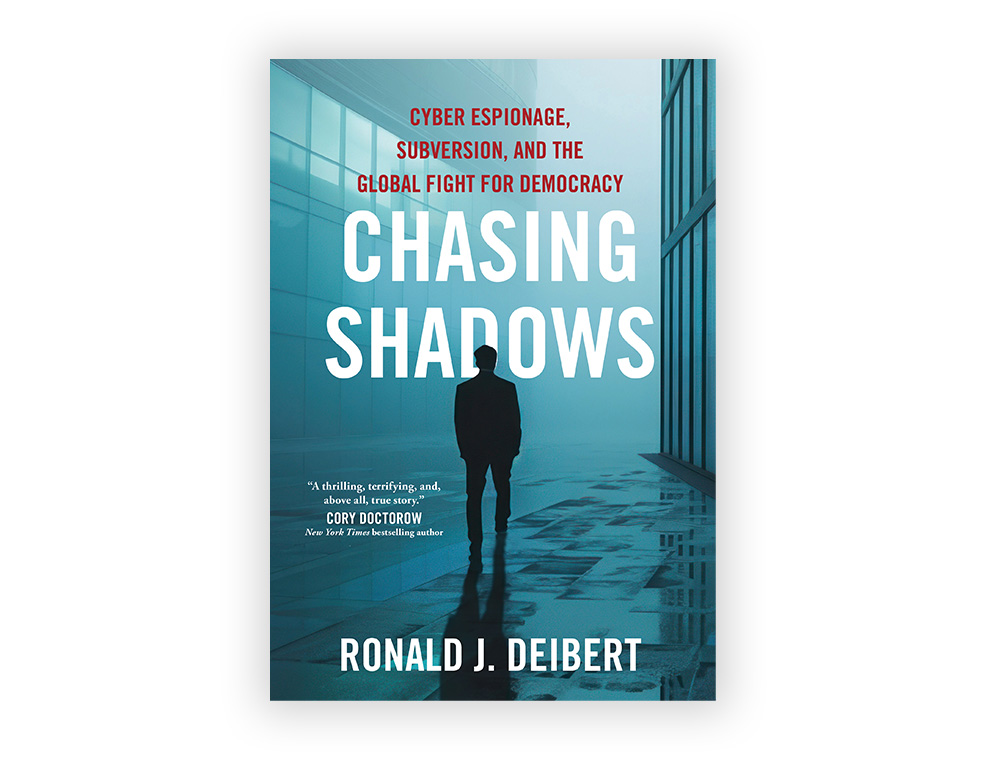Chasing Shadows: Cyber Espionage, Subversion, and the Global Fight for Democracy (2025)
Chasing Shadows provides a front-row seat to a dark underworld of digital espionage, dark PR, and subversion. There, autocrats and dictators peer into their targets’ lives with the mere press of a button, spreading their tentacles of authoritarianism through a digital ecosystem that is insecure, poorly regulated, and prone to abuse. The activists, opposition figures, and journalists who dare to advocate for basic political rights and freedoms are hounded, arrested, tortured, and sometimes murdered.
Available for order now.
Reset: Reclaiming the Internet for Civil Society (2020)
Reset is an adaptation of CBC’s 2020 Massey Lectures series of the same name. The book brings readers into a new world whose economy is based on the exploitation of the internet and its users, exposing the threats of the internet on the personal and national level. Drawing research from the Citizen Lab and other scholars on the structure of the Internet, the surveillance ecosystem, and digital security, Reset uncovers how this new and unregulated surveillance economy impacts both civil society and the environment.
Reset is a proud winner of the 2021 Shaughnessy Cohen Prize for Political Writing. The Polish version of Reset was published by Wielka Litera in 2023.


Black Code: Inside the Battle for Cyberspace (2013) and Black Code: Surveillance, Privacy, and the Dark Side of the Internet (2013)
As cyberspace develops in unprecedented ways, powerful agents are scrambling for control. Predatory cyber criminal gangs such as Koobface have made social media their stalking ground; governments and corporations are in collusion and are setting the rules of the road behind closed doors. Drawing on the first-hand experiences of the Citizen Lab and its global network of frontline researchers who have spent more than a decade cracking cyber espionage rings and uncovering attacks on citizens and NGOs worldwide, Black Code takes readers on a fascinating journey into the battle for cyberspace, and it is a wakeup call to citizens who have come to take the Internet for granted.
Black Code: Surveillance, Privacy, and the Dark Side of the Internet is the expanded version of Black Code: Inside the Battle for Cyberspace, and it includes a new preface.
Access Contested: Security, Identity, and Resistance in Asian Cyberspace (2011)
Access Contested explores the cyberspace battle happening in Asia on a daily basis. Citizens in countries like China, India and Singapore experience national struggles against Internet controls. The different countries explored offer a diverse perspective about national security, social and ethnic identity and resistance in Asian cyberspace.


Access Controlled: The Shaping of Power, Rights, and Rule in Cyberspace (2010)
Internet controls are increasing in scale, scope and sophistication around the world. The first generation of internet controls—firewalls—have paved a way for newer controls including targeted viruses, DDoS attacks, surveillance, take-down notices, usage policies and national information shaping strategies. Access Controlled analyzes these new controls in Eastern and Western Europe.
Access Denied: The Practice and Policy of Global Internet Filtering (2008)
A study of Internet blocking and filtering around the world: analyses by leading researchers and survey results that document filtering practices in dozens of countries.
Many countries around the world block or filter Internet content, denying access to information that they deem too sensitive for ordinary citizens—most often about politics, but sometimes relating to sexuality, culture, or religion. Access Denied documents and analyzes Internet filtering practices in more than three dozen countries, offering the first rigorously conducted study of an accelerating trend.


Parchment, Printing, and Hypermedia: Communication and World Order Transformation (1997)
Interweaving media theory and historical analysis, this book explores the effect new digital-telecommunication technologies, which Deibert calls hypermedia, will have on the distribution of political power in the next century. Deibert tracks the transformation of Europe from the medieval to the modern and then turns to the hypermedia age, where new digital technologies such as the Internet, encryption, and high-resolution satellite imaging favor nonterritorial institutions and communities, shifting political authority and policymaking from individual nations to transnational corporations, global financial markets, and nongovernmental organizations and activists.
